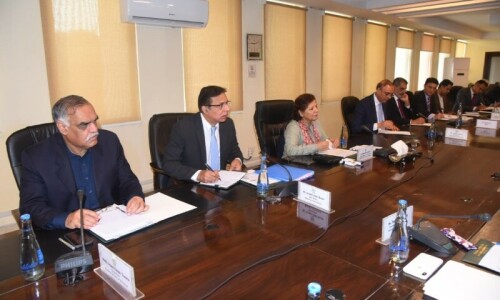It is noteworthy that the entire business community in Pakistan currently refrains from endorsing the idea of extending the caretakers’ tenure despite its recognition of the improved economic governance under Prime Minister Anwaarul Haq Kakar.
The business community unanimously advocates for timely elections and a peaceful transfer of power to the next democratically elected government, emphasising the importance of stability and progress.
The current government’s measures to curb smuggling, control power theft and line losses, and enhance confidence levels among investors and consumers have received commendation from various private-sector forums.
The relative stability in the currency market, an upswing in the capital market and sustained financial inflows from donors and a few overseas investors have interrupted the cycle of negative economic news. Although concerns persist regarding high taxes, utility rates and credit issues, the economic horizon appears less bleak than before.
Businesses have traditionally supported unelected rulers for apparent stability and high growth
Two decades ago, many business leaders held a different stance. Some openly opposed democracy while others passionately detested the political class for their perceived corruption and incompetence. As a segment, they actively supported military dictators, not necessarily for lack of option but because they considered the dictators more suited to Pakistan’s milieu.
They would make the argument of relative stability and high growth under military rule and punctuate it with the timeline of GDP growth data. It was argued that historically General Ayub, General Zia and General Musharraf had been more receptive to their ideas and responded better to their demands.
It’s challenging to pinpoint what prompted the change of heart — a collective shift in the private sector’s preference for the lawfully elected government. Are business leaders sensing a tectonic change in the power equation in Pakistan? For decades, the martial forces held unchallenged control in the country. Everyone who was anyone understood that and maintained a carefully calculated stance of being apolitical, keeping a safe distance from politicians and their antics to secure a favourable position among those who mattered the most.
The individual who was named for making the suggestion was taken by surprise when contacted by phone. Completely oblivious to the controversy, he casually brushed off the rumour as baseless. He said it was nothing more than a product of someone’s imagination and was aimed at further dividing an already fractured political landscape.
Several past presidents of the Federation of Pakistan Chamber of Commerce and Industry (FPCCI) distanced themselves from a current that posed a threat to the already challenging journey of Pakistan.
Responding briefly from Lahore, former FPCCI president Mian Nasser Hayat Magoon said: “Nothing is acceptable at the cost of democracy.” Chaudhry Muhammad Saeed, another former president of the FPCCI, expressing his views from Mirpur, Azad Kashmir, firmly advocated for timely elections. “The country cannot afford any more disruptions in the political process,” he said. He criticised deceptive elements for generating unfounded controversies, asserting that such elements peddle fear for personal gains, ultimately harming the interests of the country and its people.
Industrialist Arif Habib categorically refuted any discussion regarding the extension of the current government’s tenure in the well-attended meeting with the caretaker prime minister.
Majyd Aziz, an influential industrialist from Karachi, echoed the sentiments, affirming his support for holding elections as scheduled.
Badruddin Kaker, a prominent businessman from Quetta, cautioned against the spread of rumours and dismissed the notion of delaying elections as perilous. In a recorded message, he emphasised the need for a robust government with a mandate to address the intricacies of the economy in accordance with the aspirations of the people.
Pakistan Business Council CEO Ehsan Malik conveyed his eagerness for comprehensive reforms aimed at rectifying deep-seated flaws within the economy.
“Fundamental reforms require both time and political will, qualities more readily available to a government with a five-year mandate. The caretaker government has done a good job in setting us on the right course,” he said.
Conversely, the secretary general of the Overseas Chamber of Commerce and Industry refrained from offering any comment on the issue.
Musadaq Zulqarnain, a highly regarded and insightful businessman hailing from Punjab, stated: “People are entitled to their opinions, but I cannot endorse an unconstitutional option. Furthermore, the historical record holds testimony that unelected governments have consistently ended up in exacerbating the economic and geopolitical challenges faced by the country”.
An executive from a utility company, also present at the said gathering, said the discussion during the meeting primarily revolved around the topics of electricity and gas supplies as well as their pricing. The executive added: “The issue of elections or any potential delay was not raised throughout the course of the meeting in Islamabad”.
It’s significant that Sindh Governor Muhammad Kamran Khan Tessori facilitated the said meeting.
Published in Dawn, The Business and Finance Weekly, December 18th, 2023












































Dear visitor, the comments section is undergoing an overhaul and will return soon.